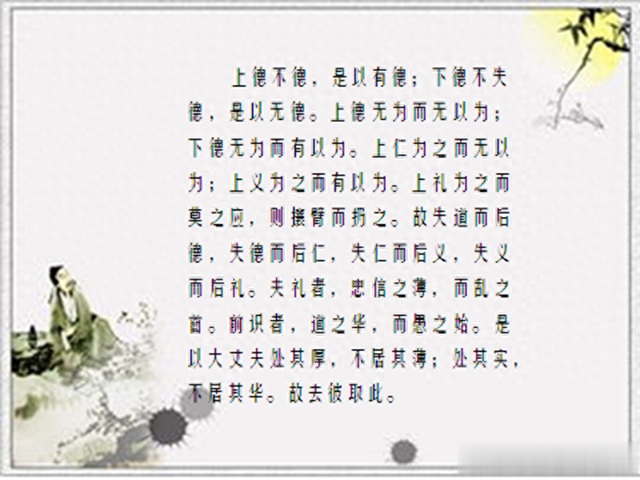第三十八章
上德不德
原文 英译
英译A Man Claiming to Be Virtuous Has No Virtue
People with high virtue do not show external virtue,
so they do have virtue;
people with low virtue show that they have not lost their external virtue,
so they actually have no virtue.
A man of high virtue does nothing intentionally,
so he does everything;
a man of low virtue has the intention to do something,
so he does nothing.
The benevolent man does something unintentionally,
and the righteous man does it intentionally.
The courteous man does something intentionally
but cannot receive a response,
so he raises his arm to tempt others.
Therefore, virtue comes after the loss of the divine law,
benevolence comes after the loss of virtue;
righteousness comes after the loss of benevolence;
courtesy comes after the loss of righteousness.
Courtesy is not only the result of the loss of loyalty and faith
but also the beginning of disorder.
The so-called foresight is nothing but the vanity of the divine law,
from which ignorance begins to emerge.
Therefore, the great man is honest rather than hypocritical and cunning;
simple rather than vain.
Therefore, we should abandon vanity and adopt simplicity.
说明1、“上德”和“下德”的英译
在老子看来,道与德是不可分割的统一整体,德是道在人类社会里的具体体现。德可以分为上德和下德,只有上德才合乎道的精神。如何翻译“上德”和“下德”才能契合老子的精神呢?Arthur Waley译成“highest power”和“inferior(下等的) power”,看不到“德”的影子,这也许和中西方文化差异有关吧。许渊冲译成“high virtue”和“low virtue”;辜正坤译成“great virtue”和“small virtue”。两位译者都用了“virtue(德行)”,只是“上”、“下”的翻译不同,但都可以接受。在我们看来,“high”、“low”比较形象生动,所以,我们就采用了和许渊冲一样的译法:“high virtue”和“low virtue”。
2、“仁”、“义”、“礼”和“信”的英译
这一章老子提出了人类的精神从德到仁、仁到义,再到礼,是一个退化的过程。“仁”、“义”、“礼”和“信”是“德”的不同层次的表现。各位译者的理解一致,但翻译有所不同。Arthur Waley:human kindness(仁),morality(义), ritual(礼),loyalty and promise-keeping(信)。许渊冲:humanism(仁),justice(义),formalism(礼),loyalty and faith(信)。辜正坤:benevolence(仁),justice(义),rite(礼),loyalty and good faith(信)。可以看出,对于“礼”的翻译,三位译者分别用了不同的三个词:ritual(仪式)、formalism(虚礼)、rite(仪式)。虽用词不同,但都能符合原意。我们则译成:benevolence(仁),righteousness(义),courtesy(礼),loyalty and faith(信)。
3、“是以大丈夫处其厚,不居其薄;处其实,不居其华”的英译
看到辜正坤的译文“Hence the true man sets store by the thick rather than by the thin, and value the fruit rather than the flower.”和Arthur Waley的译文“ Therefore the full-grown man takes his stand upon the solid substance and not upon the mere husk(外壳), upon the fruit and not upon the flower”,我们不禁失笑,因为两位译者的译法有点直,怕老子也会笑醒的。许渊冲则直译和意译相结合,译成 “Therefore a true great man prefers the thick to the thin, the substantial to the superfluous.”。我们意译成“Therefore, the great man is honest rather than hypocritical and cunning; simple rather than vain”,应该更加贴合老子的原意吧。此外,对于“大丈夫”的翻译,四位译者分别译成了 “true man”、 “full-grown man”、“true great man”、“great man”,也挺有意思的。
